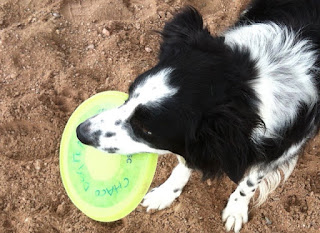I continued to throw some Frisbees for Deuce, but to no avail. Now I was getting frustrated, so I decided to end our training/game session. Later that day I try once again to encourage Deuce to run after the Frisbee and once again he wouldn’t. I started to think that maybe he was injured or that in some ways something had happened one of the times he went after the Frisbee and now he was afraid of it.
The next morning another interesting thing happened. As I was still lying in bed, Deuce asked for "permission” by using his front paw to scratch on the side of the bed to get up on our bed. Rio, who is a total snuggle bug, was already lying next to me.
Deuce hesitated and began pacing around the bed. One again, I had no explication for his behavior! This got me thinking that maybe he couldn’t get up on the bed, that there was something physically wrong with him, but then I remembered that the previous day I had actually moved all his limbs and his hips and he did this without difficulty or complaints. It occurred to me, that perhaps he was not coming up on the bed because Rio was already on it, so I asked Rio to get off the bed, which she did. I invited Deuce to get on the bed once again and he jumped up on it immediately.
From my perspective, the moral of the story is that many times we don’t know why our dog might act in a certain way or will refuse to do something we want them to do. Now, instead of blaming the dog or getting upset with our pup, we should assume that there has been a change in the environment (the environment could be anything: change in our own behavior, another animal’s behavior, a sound, smell, etc.) and that our dog is responding to this turn of events.
Sometimes the change could be very slight and difficult for us to notice. I find this to be especially true when it comes to the relationship and communication between dogs–there is so much about the relationships and communication that we just miss because of its subtlety.
It is often the case that people get frustrated with their dog and take it out on him/her, as if the dog was purposely trying to upset us or defy us when this is really not the case. The world view from the perspective of the dog is much simpler than that: their main concern is always for their safety and as such, their motivation to act in a certain way is determined by their need to be safe or to access a resource.

No comments:
Post a Comment